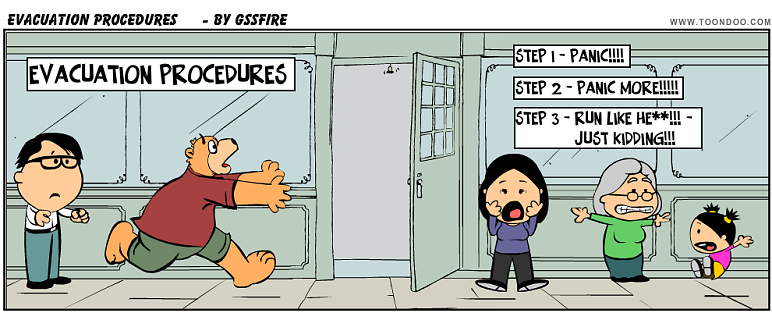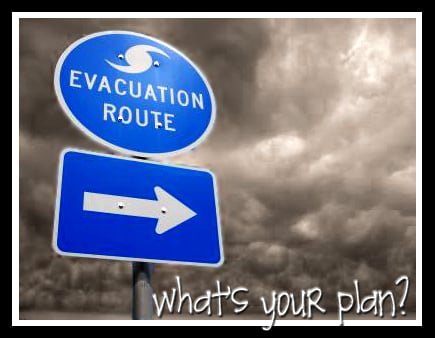Every day on the evening news, I see where many people have to evacuate their homes due to the current wildfires. While I have never had to evacuate I have been put on notice to prepare for evacuation and understand the panic that this can cause if you are not prepared and don’t have an evacuation plan. There are really two types of evacuations, one where the evacuation is likely to be long-term such as TEOTWAWKI or a local evacuation in which you can return even if your property is damaged or destroyed. A wildfire, hurricane of earthquake would be an example of this.
Either way you need to have an evacuation plan. The following is a list of ideas to help you prepare your own evacuation plan. While this list is slanted towards a local emergency, many of the ideas will apply in both cases.

Your evacuation plan
- Make a list of whom the plan will cover.
- Gather information on phone numbers and email addresses. Everyone should have a contact list.
- If possible, have an out of state number to use to leave messages. In a localized disaster with the phones working, it is often easier to call out of state than across town. Make sure everyone memorizes the number. You may not be able to access numbers on your cell phone.
- Know how to use text messaging. In a recent fire that destroyed 69 homes in our community, texts went thorough when phone calls did not. I understand that voice and text messages are sent on two different systems.
- Make sure you know the kids phone numbers, they are better at answering than the adults.
- Have a plan on who will pick up your kids from school or elsewhere. You need to give your kids a safe word and they should not leave with anyone who does not have the safe word.
- Take into consideration any manmade or natural conditions that may affect your area. This could include such things as the most likely type of disaster that you would face, or geographic conditions such as rivers that may affect your evacuation plan.
- To prepare for a fire in your home, take a walk through your home and inspect all possible exits and escape routes. Remember to make sure the escape routes are clear and doors and windows can be opened easily. Don’t let your security against burglars trap you in your own home.
- In case of a fire in your home have an outside meeting place. I have personally investigated an incident in which a father went back into a fire and died trying to rescue a daughter who was standing in their back yard. The meeting place can be as simple as the telephone post down the street.
- Try having practice drills you will find your weaknesses.
- In case of a serious long-term emergency, know where you would ride it out. Whether you bug out or bug in have a plan. If you plan to bug out know several alternate routes to your destination.
- Have alternate meeting places. If members of your family are at work or elsewhere, you need to have a location at which you met up.
- Have your bug out bag ready and everyone in the family should know where they are and what to take with them. You should have one for every member of your family and it should be updated as the seasons change. Change from summer to winter clothing for example.
- Copies of your important documents such as insurance cards, house deed, photo ID or state driver’s license, passport, bank information, physician contact information and family contact information as well as cash in small bills should be in one location and easy to access.
- Keep a full tank of gas in your car. Gas stations may be closed during emergencies and unable to pump gas during power outages. Your may want to have extra gas on hand.
- Listen to a car or battery-powered radio for emergency information.
- Gather your family and go, if you are instructed to evacuate immediately from say fire or flood.
- Decide what to do about pets and other animals before you are faced with an emergency. Eighty percent of the people who died during Katharina bugged in rather than leave their animals.
- If you have time. Secure your home: Unplug electrical equipment, such as radios and televisions, and small appliances, such as toasters and microwaves. Leave freezers and refrigerators plugged in unless there is a risk of flooding.
- Close and lock doors and windows.
Here is a link to a previous post on Planning Your Evacuation or Bug Out Route that make help you with your evacuation plan.
Howard


Excellent advise!
Shortly after 9/11 in the DC Metro area, we really were not sure what we might get. I was then detailed to OEM and they were really worried about a nuke, or dirty bomb…. The anthrax scare at the post offices and the Beltway Sniper incidents also gave pause and food for thought. Those were unsettling times.
NOW I am retired and am living at where my bugout location would have been then. I would ask:
Do you have food storage to easily sustain your crew for a month or more?
How about enough cash so that you don’t have to rely whether the banks will give you what you need to pay the mortgage on time.
Maybe you thought that you wouldn’t be paying your bills during the big disaster.
There’s a good possibility that 3 months from the beginning, everything will be back on track again, but what if not?????
Do you have a way of generating a small amount of power to charge batteries. Run it a couple of hours a day to ration the fuel that you have on hand. How much fuel do you have on hand. Have you got essential your meds stocked up 6 months worth?
A lot of things you will still be able to get you, or will just have to stand in line for 4-5 hours. Are you running an electric range now?
Do you have alternative cooking methods for the long term. How about heating in the winter. Have you got a back-up for that as well. How about washing clothes? What is your plan.
Trust me, improvising is NOT a plan so don’t tell me what you can improvise. Tell me what you have tested and implemented…..
Potable water storage and treatment, food, fuel, first aid, meds, clothing, hygiene and sanitation top the list. Typical macho fixation on weapons and ammo is a distraction.
Food, water, fuel, clothing, shelter and medical need to come first.
Have enough cash for a month’s expenses.
A year’s supply of food storage and personal meds.
Adequate shoes, boots, socks, underwear, and outdoor work clothing to stretch for two years.
You can’t have too many stored batteries of all sizes that you use!
1000 gallons of propane underground for the generator, is a minimum.
Tools, fasteners, wire, tarpaulins, roofing repair materials.
Hoses, belts, oil filters, motor oil, fuel stabilizer.
Unless you’ve already got all that, don’t talk to me about guns and ammo…. You can’t eat them!